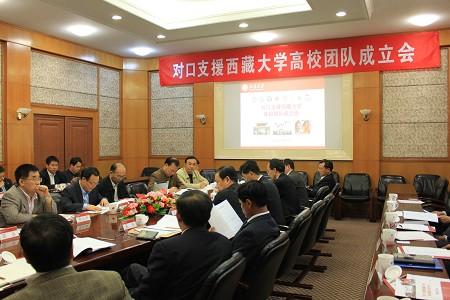Peking University, Oct. 15, 2010: The inaugural meeting of the "Team of Universities for the Coordinated Cooperation with Tibet University" was held in Peking University on Oct. 13. Representatives were from China s Ministry of Education (MOE) and member universities, such as Peking University, Wuhan University, and China Agriculture University. Prof. Wu Zhipan, Executive Vice President of Peking University, presided over the meeting.
Since the democratic reform of 1959 in Tibet, China s central government has implemented a series of policies in supporting this autonomous region, including coordinated assistance from relatively developed inland provinces and municipalities, in order for an all-around development and people s well-being.

Tibet University Party Secretary Fang Lingmin briefly introduced the university and its future development outlook. He appreciated the longtime cooperation with and assistance from all those universities. Following the guidance of the MOE and with the help of the whole team, Tibet University will spare no effort to build a world-renowned university distinguished in the western regions of China.
PKU President Zhou Qifeng pointed out in his speech that the development of Tibet University isclosely related to the stability and progress of Tibet, and is a key to the country s strategy of Western Development. He also noted that PKU, which has been cooperating and communicating with Tibet University for years, will try its best to continue undertaking the mission in alliance with all other members.
PKU Executive Vice President Wu Zhipan introduced in detail the plan for the work of coordinated cooperation in different aspects. According to the lay-out, Peking University plays a leading role in this team, while Wuhan University, China Agriculture University, and Southwest Jiaotong University serve as deputy, and Central University of Finance and Economics, Hohai University, and South China Normal University as members. Prof. Wu pointed out that PKU will coordinate with other universities in the work, and it is mainly responsible for the construction of faculties of literature, health science, and relevant disciplines of Tibet University.
Representatives from member universities discussed the Working Plan for the Coordinated Cooperation with Tibet University" with a consensus to strive for better development of the university.
Kang Kai, deputy director of the Department of Education of the Tibet Autonomous Region, said that higher education in Tibet has made remarkable achievements in recent years though it may still need the support and guidance of other universities. Zhang Daliang, director of the Department of Higher Education of MOE, highlighted the importance of the coordinated cooperation with Tibet University and made comprehensive suggestions on the work.
According to Xinhua, as the largest institution of higher learning in Tibet, the university accommodates more than 5 000 students, of which 950, or nearly 20 percent, are majoring in Tibetan studies. It has arranged a curriculum for graduates specializing in Tibetan language and literature, the history of the Tibetan ethnic group, and traditional Tibetan paintings and music.
In 2001, the Tibet Medical College and the Department of Medicine of the Tibet Institute for Nationalities were incorporated into Tibet University.
Translated by: Chen Meng
Edited by: Jacques
Source: PKU News (Chinese)
Related News
Photos
More>>history
Traditions
- PKU Volleyball Team Retains Title in Municipal Competition
- Prof. Li Yining: Fifty-five Years Devotion to Economics and Education
- PKUSZ Holds 1st Field Day
- International Conference on China Studies and Oversea Chinese Books held at PKU
- Inaugural Meeting of Joint Research Center for Navigation Satellite held at PKU
arts
- Latest Discovery of Prof. Wang Enge's Team Published in Physical Review Letters
- National Wetland Conservation and Restoration Technology Center Set up at PKU
- Warm Blood, Love Heart from Peking University
- Noble and Diligent in His Lifetime: Prof. Xu Xianyu's Funeral Held
- The First Forum of Cultural Industry Frontier Held at PKU





